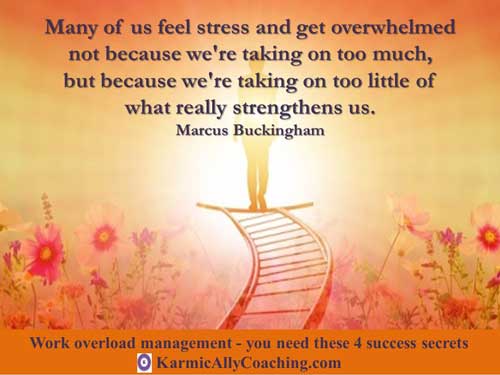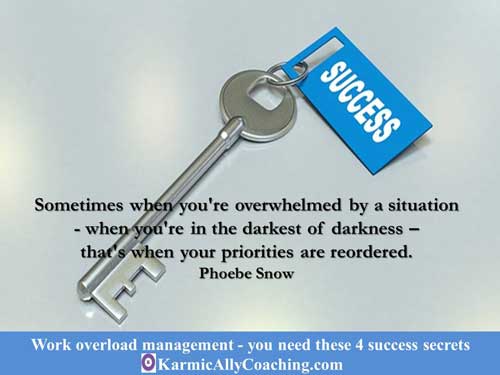This post has already been read 3598 times!

In my early career days, I often found myself being loaded with extra tasks because my boss knew I would deliver. I had the reputation of being reliable, organized and a lot of other nice attributes but I felt overwhelmed at times and experienced work overload.
When I cribbed about it to my father, he told me I had to be more assertive and find ways to manage my work overload if required.
Then he shared a quote Benjamin Franklin is reported to have said that has stayed in my mind, “If you want something done, give it to a busy person.”
There are always those times in the workplace when urgent and important tasks need to be completed which can overwhelm even the most efficient and effective employee.
This doesn’t necessarily need to be at the year-end but there are those seasons and days when it all comes to a head.
Here’s a 4 step approach to effectively reduce stress, overwhelm and even avoid burnout

Overworked and overwhelmed
Take Stock of the Situation & Prioritize
Instead of going headless chicken, take stock of the situation and see if the workload can be lessened in order to give you the breathing space to concentrate on the most important task at hand.
The first step would be to find the time, preferably outside of the workplace and start making a list of all the tasks that need to be done and the stretch deadlines in free flow writing. Then mark them by numbering in terms of priority. Sometimes, simply putting things down in writing provides the required clarity and eliminates possible panic attacks.
My post, 5 tips to manage Time Targets will also help.
Delegate effectively
Once that is done, start looking at which tasks can be delegated based on the resources available to you at the office. Consider the competencies of your team members and write their names against it. Since there are deadlines, other people may also be busy and I suggest noting down, if possible, names of two colleagues whom you may ask. Do remember that the ultimate responsibility still rests with you.
If you find that your own tasks even after possible delegation is still overwhelming then consider asking your manager or immediate superior for help in prioritizing those tasks. Armed with your list, make your appointment with them to engage their assistance. Since the higher reporting rests with your supervisor, they are in a better position to further streamline the priorities to enable your workload to become more manageable.
No boss under the sun likes unpleasant surprises and by showing your commitment with your action plan you maintain your credibility and commitment. Make sure to take notes during your meeting so that you have evidence of the agreed plan of action if required later.
Build Self-Management into your daily routine
Self-management too is an area to work on to handle stress and time pressure adequately. When planning your day, make sure that you build in some ‘me time’ as well and engage in activities that help you to relax and wind down. Depending upon your personal preferences, this could include going to the gym, power walking or less high impact exercises including yoga and Pilates. Make sure that your family life is not compromised and make sure that you spend time with them. Eat sensibly and get the right amount of sleep.

Learn the art of saying ‘No’
This is one area which many of my clients find challenging. Learn to say no to those activities that are not high up in your priority list or just eat up time without any benefit.
It means establishing personal boundaries.
The bottom line is engage in activities that work for you. There may of course be times when your saying No can affect an entire process or project. So use this skill with discretion.
To sum up, while pressure and stress cannot be eliminated completely, taking steps to action areas that are within our control can help to mitigate their impact on our lives and our health.
How do you handle situations of work overload in your office? Are there any strategies or tips that you can share with me and other readers?
PS. Think you might be heading for a burnout? If yes, then I suggest you try the Burnout Self Test. This simple self-assessment will point you in the right direction along with strategies that you can starting implementing immediately. Like the saying goes, “A stitch in time saves nine”.
Written By: Vatsala Shukla
This post was originally written in June 2012 and has been updated in May 2018 for relevance and new resources for the reader.






 I adhere to the Certified Coaches Alliance Code of Ethics and Standards. A copy is available on request.
I adhere to the Certified Coaches Alliance Code of Ethics and Standards. A copy is available on request.
 Let's Talk through the Connect Form:
Let's Talk through the Connect Form:
Self Management is my saviour, my daily morning rituals empower me and allow me to focus on what is important before the day starts. Say no is a big one for me too. Yes we have to do what lights us up, as when we are lit up we affer so much more value great post xx
Learning to say No was one of my biggest achievements when it came to handling work overload, Suzie. Sooner or later, people get the message. Self Management is sacred to me too.
Oh Vatsala, Yes, you hit the nail on the head with the Power of NO! And your poster that pointed out the reason many of us are overloaded is because we take on too much that is of such little benefit to us. Thanks for the reminders.
You’re welcome Kathleen. 🙂
Saying ‘no’ is a great tip. So much energy is spent in doing low-productive things – their absence will only be felt in terms of the added boost of energy and creativity that comes from eliminating them from your day! Always great advice, Vatsala!
Thanks Reba. Saying no to time eating activities without any benefit releases energy to do the tasks that make a difference and less overwhelm.
Hi Vatsala,
Learning to say “no” is a great tip. Too many of us allow more and more and more to be added onto our plates, when the reality is much of those things aren’t that important. They can be dealt with later. Or they can be assigned to someone else.
Hope you’re doing well!
– Kevin
Hi Kevin, good to see you again! I sometimes feel that there should be a course on the art & science of saying No. 🙂 More often than not, we have a problem with saying No even when we know that the request is for something trivial or a task that can be done by someone less experienced because of our conditioning in childhood to be helpful or the fear that we may become unpopular. Sometimes we do need to go out of the way to help others but stepping back and looking at where the request fits in with our set of tasks and priorities is a good way to dump the time wasters – provided we can actually say No. LOL